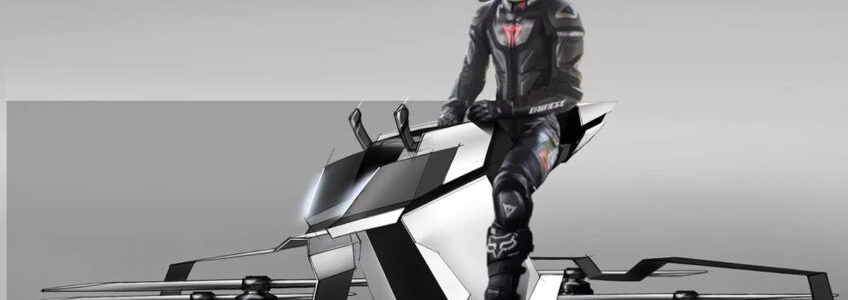Not that long ago everyone thought the new millennium would usher in flying cars, electric hoverbikes and other advanced tech. It’s no longer just a fantasy as portrayed in sci-fi movies with flying cars and electric hoverbikes in daring police chases. Technology is now at the point where that dream could, in fact, become reality sooner than we think. Not just for military or police purposes, but a much broader horizon awaits us all.
Rise of the Electric Hoverbike
The Russian company, Hoversurf, dedicated a lot of resources and effort into the SCORPION project. At its core, the concept is simple – an electrically powered vehicle combined with a motorcycle seat and quadcopter drone technology. It was designed for extreme conditions and contains in-house custom software for manual or automated control. The idea was to resemble a dirt bike in terms of size and shape.
All the research and development paid off making the SCORPION 3 electric hoverbike an incredible piece of engineering. Reports suggest that flying the hoverbike is as easy as riding a bike. With drone technology comes improved speed, agility and stability so even amateurs can master the craft.
Dubai Police and the Electric Hoverbike
Utilising the hoverbike for a high-speed pursuit is not on the cards, at least not yet. Top speed is just 43mph (75km/h) but the maneuverability and mere 660 pound cargo capacity make it the perfect first responder. Flying at an altitude of 20 feet means the electric hoverbike can reach accident scenes faster and easily access areas bigger vehicles can’t.
As the hoverbike is not constrained to the pavement or roads, it can fly in a straight line to reach its destination. The downside is that current technology only gives the hoverbike a 25 minute flight time before having to recharge. It won’t be too long before battery and energy storage technologies are improved upon. Big strides have already been made by the Ionic battery tech company as well as the cutting edge Lithium-Air (Li-Air) battery. It can reportedly store up to 40 times the charge of a conventional lithium-ion battery.
Advanced Hoverbike Research and Development
The electric hoverbike is not exclusive to Dubai. In fact, the US Army has been working with the UK based Malloy Aeronautics on a possible battlefield resupply drone. The prototype is electric but researchers are investigating a hybrid propulsion system to increase the load and range. Other developments include Airbus with their Vahana personal flight project and German e-volo’s Volocopter. Adding further impetus to the concept of personal flight, universities around the world are also becoming more invested.
Watch this fascinating footage to see the electric hoverbike in action and visit Hoversurf for more information or to pre-order your very own.
There is a bright future ahead – one where electric hoverbikes and other personal flight technology could replace our conventional transport methods. Current technology allows us to only cover short distances but before long, we’ll be able to go much farther.
PRV Engineering has design and development services to help you bring your idea to reality. Our extensive service offering allows us to help you take that idea right through to manufacture. We provide a host of services to numerous industries so if you have a project in mind, get in touch.


Recent Comments